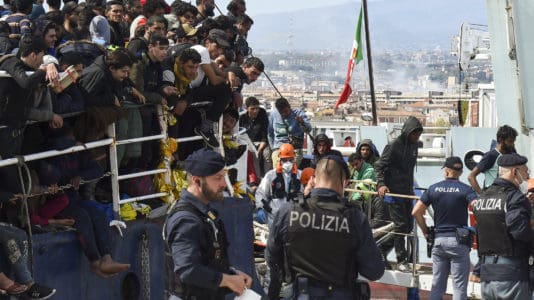As the director of the Machiavelli Center, could you tell us what exactly is this conservative think tank?
Well, the Machiavelli Center is a center for political and strategic studies. It is quite a classical think tank. What we do is policy papers and reports that are specifically designed for the members of the parliament and of the government, i.e., Italy’s decision makers. We also organize a lot of events and conferences, especially in Rome and in the parliament, but not only. We also now provide post-degree courses at university for specific careers.
In English, there is the word Machiavellian, and its connotation is rather negative. According to the Cambridge Dictionary, being Machiavellian means using clever but often dishonest methods to deceive people so you can win power or control. So why do you want to be associated with this Machiavelli?
Machiavelli actually has the same negative meaning in Italian. However, nowadays Machiavelli is widely recognized as one of the greatest political thinkers, one of the founders of political science, and in particular Machiavelli symbolizes the effort to connect scholarship with decision-making. And this is exactly what a think tank and especially our think tank is trying to do. Machiavelli was a scholar who, instead of just staying in the proverbial ivory tower, chose to be in civil society, in the political sphere, and to use his academic knowledge, his research, and his thought to do something good for the management of the state.
Moreover, Machiavelli was also a great Italian patriot. His philosophy has been oversimplified to: the end justifies the means. But the end for Machiavelli was the creation of a unitarian state for Italy because he was a true patriot.
You’re not only the director of the Machiavelli Center, but also an expert on jihadism and the Middle East. In light of Machiavelli’s recommendations for princes, what would you say of Western Europe’s present approach to immigration and the rise of Islam in Europe?
If we talk of mass immigration, almost everyone recognizes that there is an issue. But before you tackle a problem, you have to ask yourself, “Why is it a problem?” If you give two different answers, you’ll get two different solutions.
For me, immigration is a problem mainly because it looks more and more like a foreign colonization of our land.
For super moderates, the issue is probably just the fact that it is happening illegally. For others, there is no problem at all, or maybe just that this mass immigration generating popular discontent can also fuel right-wing sentiments. For example, before Matteo Salvini was interior minister (in 2018-2019), his left-wing predecessor Marco Minniti tried to curb illegal immigration. He said that he did so solely because he feared the popular discontent generated by this phenomenon.
And then finally comes the far left, the neo-Marxists. For them, immigration is a positive phenomenon. Why? Because it is replacing the working class as the revolutionary subject in order to destroy the European tradition and make room for social engineering.
So, in light of Machiavelli’s teachings, what would you say of Victor Orbán’s rule in Hungary?
Well, I think his rule is very positive. Obviously, I see things from abroad, from Italy. There is also a language barrier, so I do not have the pretense to be a complete connoisseur of Hungarian politics and policies. But I’m sure that Orbán, from what I know, is a source of inspiration for conservatives in all of Europe because he managed not only to lead his country with admirable consistency with conservative values, and this is a very important thing, but also to do it effectively.
Apparently, from what I see, Hungary is a well-functioning country. What he is doing actually works. And also, if we look at the think tank environment in Hungary, now we are at this wonderful CPAC Hungary, which is a great event that I also attended last year. Hungary is becoming a focal point for all conservatives in Europe and also in North America.
Orbán, Fidesz, and Hungarian conservatives have created institutions such as the Center for Fundamental Rights and the Mathias Corvinus Collegium as well as many others that are doing a great job. All think tanks, such as the Machiavelli Center, are trying to take inspiration from them and replicate what they’re doing.
We’re speaking here from a “no-woke zone” at CPAC. I don’t know if you have an explanation for this, but usually, wokeness means both support for mass immigration in Europe and the LGBT revolution with this whole gender ideology, not to mention the green revolution. So that’s all those things together, but I can’t see any logical link between them. They’re even kind of contradictory. You are an expert on jihadism: for LGBT people, radical Islam and the presence of jihadists linked to immigration are actually a threat.
We have to ask what wokeism actually means. After the 60s and 70s, the neo-Marxists realized that the working class was not going to be a true revolutionary subject for them. It wasn’t going to overthrow the structure of society and economy in Europe, so they changed their focus.
In their analysis, they concluded that the structure was no more the economy but the language, because the language and the way we define fundamental categories, and so on, shape the way we think. So, this is the idea that they are “awoken.” They think they are seeing something that nobody actually saw before. This is the meaning of wokeism.
Now, it’s true that on radical Islam… In general, Islam is obviously a traditional culture, not of Italy, but it is the traditional culture of another civilization. And we must respect it. I do respect Islam, even though I’m not a Muslim and I wouldn’t like to be a Muslim. However, I have to recognize that Islam has many positive elements like any other traditional culture and traditional civilization in the world. The vision of LGBTQ issues in Islam is in some ways closer to us Western conservatives than the view of progressives.
That does not mean that we have to accept radical Islam just because maybe we can find common ground on some things. But it’s true that since now many Muslim citizens are becoming part of our society… I am against mass immigration, but obviously, I accept the idea that those Muslim citizens cannot be expelled from our countries. They must become an integrated, I would even say, an assimilated part of our countries, and they are exactly equal to other citizens since they are here. And with those Muslim citizens in Europe, we can probably find common ground on many social issues. So there is room to turn some of them into conservative voters in the future.
According to you, with the rise of Islam linked to mass immigration, what is the situation in Italy compared to France or Germany with the overall number of Muslims, but in particular with radical Islam and the threat of jihadist terrorists?
Well, we should start from the point that immigration numbers and therefore also the spread of Islam in Italy are way lower than, for example, in France, Germany and Belgium. That’s because mass immigration started later in Italy. Until the year 2000, there were really few immigrants in Italy. The boom in arrivals started in 2011. So this allowed us for many, many years to effectively integrate Muslims into our societies because they were few and were well distributed on our territory.
So in some way, we could assimilate them. Now, because of mass immigration, the numbers are getting larger and larger, and they are creating closed communities in some districts, so a problem has emerged. Not only with radical Islam, although we have some radicals in Italy, but still much fewer than in other countries. But there is also the problem of common crime. There are a lot of second-generation immigrants, especially with an Arab and in general Muslim background, who are becoming part of criminality.
Why am I mentioning them in connection with radical Islam?
Often the identity factor is important. They form gangs, especially baby gangs that are created around their common ethnic background. And they are frequently fueled by hatred toward Italians, toward Westerners, toward white people.
Some months ago in Italy, a tourist resort city, Peschiera del Garda, was for a day literally occupied by thousands of young people of African and Arab origin, who under the slogan “Peschiera is Africa” committed widespread burglaries and widespread violence and sexual harassment, and this was racially targeted against White people.
So this is a big problem emerging, maybe even bigger than just that of radical Islam because you can tackle radical Islam with security instruments, with intelligence, with police, and so on. This kind of social unrest and distress is more difficult because in that you need a major overhaul of your policy on migration, on asylum, but also on cultural integration or assimilation, on social issues, social housing, and many other things. So it would really require a new mentality on the part of our rulers.
In that respect, what do you think of Giorgia Meloni’s policy on immigration?
Well, Giorgia Meloni campaigned on the promise to totally halt illegal immigration. She said that she would manage to be even more effective than Matteo Salvini, who was very highly effective as interior minister, as he curbed illegal immigration hugely, reducing it to very small numbers.
For now, the numbers are not very good for Italy. We have experienced a surge in arrivals of illegals by sea. Those numbers projected for the whole year would make this year a record year for illegal arrivals in Italy. I’m sure that this is not what Georgia Meloni wants. She will not allow that to happen because it would be very hard for them to justify it politically, as it’s not her platform, it’s not what she stands for. So I expect that around July-August when we usually have a peak in arrivals, she is going to change her policies, even if that means that we are going to have some quarrels and some clashes with the European Commission and some EU countries such as France or Germany.
Daniele Scalea is the director of the Italian conservative think tank Machiavelli Center and an expert on the Middle East and jihadism. He served as the Special Advisor on Immigration and Terrorism to the Undersecretary of Foreign Affairs (2018-2019).





